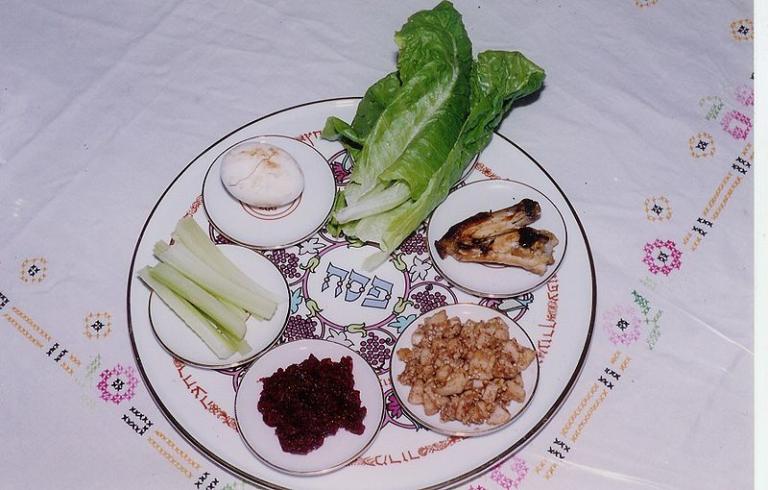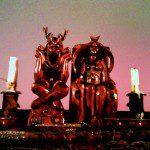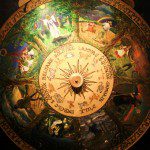You haven’t lived until you’ve heard a roomful of drunk Pagans shout “Next year in Jerusalem!” at the end of a Passover seder. We’ve been doing this for more than a dozen years and it has become such a part of our local traditions that if the priestess in charge suddenly stopped doing them, there would be angry mobs brandishing horseradish and parsley. Said priestess happens to be my best friend in the Universe and started doing them because it was something her mother had done. There’s more to that story and because parts of it are deeply personal for her, I’ll just say that it isn’t my story to tell and leave it at that. Regardless, I was at the first one she did and have been to almost every single one since. My daughter has grown up searching for the afikomen once every spring instead of for Easter eggs and when she begs me for a new dress this time of year, it’s because she wants it for Passover.
It’s strange, in a way, that thirty or so Pagans of various backgrounds should gather for a decidedly Jewish celebration. After all, I’m pretty sure there’s not a monotheist among us and there’s no obvious reason for us to care about this bit of Jewish mythology. After all, we weren’t slaves in Egypt.
It’s partly the food. We have rosemary lamb, matzah, scarlet chicken, tomato salad, more matzah, veggie kugels, sweet potatoes and carrots, chocolate matzah, homemade horseradish, charoset, yet more matzah, and wine. I have always thought that it’s easier to listen to someone’s ideas when they’re feeding you good food and oh, is the food good. If the holiday held zero meaning for me in a spiritual sense, I’d still come for the food.
The wicked witch would ask “What is this holiday of yours?” as if it didn’t concern her and then she’d cackle and try to take your little dog, too. I’ve adopted this holiday as my own because the idea of freedom is a universal one and in the story of the Exodus, where a Jew might see the work of the one ineffable G-d, I see the hands of the Theoi, particularly of Apollo the bringer of plagues (for obvious reasons, if you’re familiar with the story). I don’t rightly care if it’s heresy on either front, it feels right to me. Blessed Phoebos brings light where it is dark and if you’ll travel with me down Metaphor Lane for a bit, the story of the Exodus is not only a story of movement from slavery to freedom, but one from darkness to light. There doesn’t exist a people on the Earth that hasn’t been subject to some form of slavery or oppression. Even if our literal ancestors were not slaves in Egypt, we’ve all been shackled by the darkness of slavery and the story of Exodus is as good as any to tell the story of oppression of the other throughout human history. I come from Irish and Native Americans myself and neither history is a happy one. I also live in the land of cotton and the vestiges of a culture that enslaved others still remain. I saw a bumper sticker recently that bore a confederate flag and the words “The South was right!” I was disgusted to say the least because the slavery part of that conflict was what my people call “wrong.” We were all slaves in Egypt.
To move even farther from the literal, we enslave ourselves in more ways than I can list. Some are slaves to addiction, others to what and who they “should” be, and still others to oppressive thoughts that prevent them from being truly themselves. Deciding to be free and moving from those places of darkness is often a struggle and as I read of the obstacles that impeded the Hebrew people in their flight, I remember my own struggles to freedom. My worst taskmaster was OCD and it was difficult to free myself from it, but I mostly have and I thank the gods for helping me through the worst of it. To throw a little Buddhism in there, freedom from attachments and acting with loving kindness lead you down the path to enlightenment. For me, Apollo is enlightenment and the more I become truly myself, the closer I am to him.
Enter Dionysos, riding on the back of at least four glasses of wine. Almost any ritual that requires four glasses of wine is a good one as far as I’m concerned. As per my previous post, I’ll be drinking grape juice this time, but there is no doubt in my mind that the Wine-dark god will celebrate with us again. Dinner inevitably transitions into revelry once the formal part of the ritual is done. We dance, sing, let our hair down, and generally cause a joyful ruckus. We let go and free ourselves from care. Dionysos is a god of freedom as much as anything and it’s hard to hang on to any of your attachments whether you’re letting go because of the wine or because dancing is really fun. After the seder, when we’ve gone through the struggles of the Exodus and have moved toward the brightness of true freedom, it is time to really experience that freedom with your whole self. We have a loud, drunken catharsis and even if we wake up sore and hungover the next morning, we vow to do it again next year. Maybe we won’t do it in Jerusalem, but next year for sure.


















